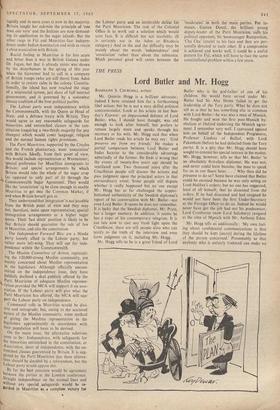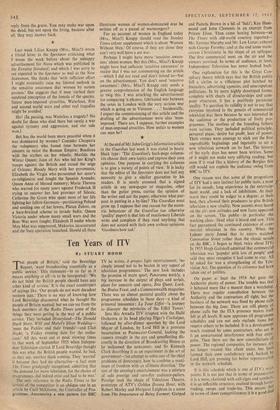THE PRESS
Lord Butler and Mr. Hogg
RANDOLPH S. CHURCHILL writes: Mr. Quintin Hogg is a brilliant advocate: indeed I have retained him for a forthcoming libel. action; but he is not a very skilful political controversialist. Look at his article in last Sun- day's Express: an impassioned defence of Lord Butler, who, I should have thought, was old enough to look after himself, but prefers to remain largely mute and speaks through his secretary or his wife. Mr. Hogg said that when Lord Butler reads his article he may say : `God preserve me from my friends.' He makes a partial comparison between Lord Butler and Judas Iscariot to the .considerable advantage admittedly of the former. He finds it wrong that the events oaf twenty-five years ago should be ventilated now. Two thousand years after the Crucifixion people still discuss the actions and pass judgment upon the principal actors in that extraordinary event. Some people still dispute whether it really happened but no one except Mr. Hogg has so far challenged the copper- bottomed authenticity of the Swedish diplomat's report of his conversation with Mr. Butler—not even Lord Butler. It seems he does not remember. It is lucky that the Swedish diplomat, Mr. Prytz, has a longer memory. In addition. it seems he has a copy of his contemporary telegram. It is too late now to cast any fresh light upon the Crucifixion; there are still people alive who can testify to the truth of the interview and even form judgment on it, including Mr. Hogg.
Mr. Hogg tells us he is a great friend of Lord
Butler who is the god-father of one of his children. He would have served under Mr. Butler had Sir Alec Home failed to get the leadership of the Tory party. What he does not tell us is that he has something else in common with Lord Butler—he was also a man of Munich. He fought and won the first post-Munich by- election at Oxford endorsing the Munich agree- ment. I remember very well. I canvassed against him on behalf of the Independent Progressive, Professor Lindsay of Balliol, with Lord Pakenham (before he had defected from the Tory party). It is a pity that Mr. Hogg should have sought to conceal his special interest in the matter. Mr. Hogg, however, tells us that Mr. Butler 'is an absolutely first-class diplomat. He was not, and never could have become, the man to speak for us in, our finest hour. . . .' Why then did he presume to do so? Some have claimed that Butler could be excused because he was only acting on Lord Halifax's orders; but no one has suggested, least of all himself, that he dissented from the orders. If he had dissented and had resigned he would not have been the first Under-Secretary at the Foreign Office to do so. Indeed he would never have got the job had not his predecessor, Lord Cranborne (now Lord Salisbury) resigned at the time of Munich with Mr. Anthony Eden.
Mr. Hogg tells us additionally : 'My own feel- ing about confidential communications is that they should be kept [secret] during the lifetime of the person concerned.' Presumably so that anybody who is unfairly traduced can make no reply from the grave. You may make war upon the dead, but not upon the living, because after all, they may answer back.
Last week Lilian Knapp (Mrs., Miss?) wrote a frivial letter to the Spectator criticising what I wrote the week before about the unhappy advertisement for Nova which was published in the Evening Standard; and which I was sorry to see repeated in the Spectator as well as the New Statesman. She thinks that 'with sufficient effort I might eventually raise my limited outlook to the sensitive awareness that women by nature possess.' She suggests that if men 'curbed their outdated conception of the female of the species, future man-imposed atrocities, Waterloos, first and second world wars and other real tragedies might be avoided.'
Hol (In passing, was Waterloo a tragedy? No doubt for those who died there but surely a war against tyranny and aggression, and our side won.)
But has the world been more peaceful when it was dominated by women? Consider Cleopatra the voluptuary who found time between her amours to resist the Roman Empire; Boadicea with the scythes on her wheels; Matilda the Winter Queen; Joan of Arc who led her King's troops against the British and raised the seige of Orleans; Bloody Mary with her pyromania; Elizabeth the Virgin who persecuted her sister's co-religionists and fought the Spanish Armada; Queen Anne of blessed memory; Maria Theresa who warred for many years against Frederick II trying to recover her lost province of Silesia; Catherine the Great who spent most of her life fighting her fellow Germans—partitioning Poland and sending one of her lovers, Platon Zubov, on a hare-brained scheme to invade India; Queen Victoria under whom many small wars and the Boer War were fought; Elizabeth II under whom Mau Mau was suppressed, Makarios incarcerated and the Suez operation launched. Should all these
illustrious women of women-dominated eras be written off as a parcel of warmongers?
For an account of women in England today (Mrs., Miss?) Knapp should read the Sunday Times colour supplement which is about 'Women Without Men.' Of course, if they are alone they can't very well have a sex war.
Perhaps I might have more 'sensitive aware- ness' about women. But this (Mrs., Miss?) Knapp might have had sufficient 'sensitive awareness' to realise that I was not commenting on the article —which I did not read and don't intend to—but on the advertisement. You don't need 'sensitive awareness'; (Mrs., Miss?) Knapp only needs a greater comprehension of the English language to twig this. I was attacking the advertisement for comparing 'a phoney, fabricated war between the sexes in London with the very serious war which is going on in Vietnam. . . .' Incidentally, I expect the commissioning of this article and the drafting of the advertisement were also 'man- imposed.' There are, I suppose, further examples of man-imposed atrocities. How unfair to women can men be?
At the end of Mr. John Grigg's informative article in the Guardian last week it was stated in heavy black type: The Guardian's back-page column- ists choose their own topics and express their own opinions. One purpose in carry" ing the columns is to give a variety of points of view.' It is lucky that the editor of the Spectator does not feel any necessity to give a similar guarantee to his readers. It is surely assumed that a signed article in any newspaper or magazine, other than the gutter press, carries the opinion of the writer and not the paper, otherwise what pur- pose in putting in a by-line? The Guardian must grow up. I suppose that one reason for the eccen- tric behaviour of the Guardian (an otherwise 'quality' paper) is that lots of reactionary Liberals write and complain if they read anything that does not accord with their own archaic opinions. 'Goodness how sad.'































 Previous page
Previous page